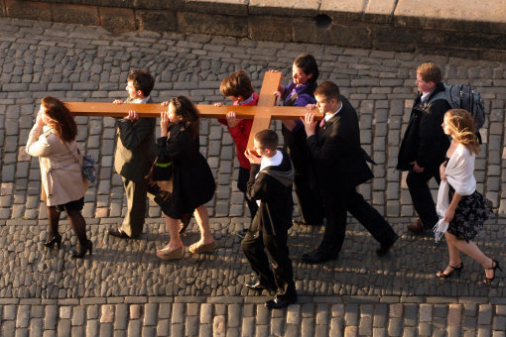
Churches across Scotland are refusing to be discouraged by today's statistics from the 2011 Census which shows a drop in the number of people identifying themselves as Christians.
According to the latest statistics released from the 2011 Census, 54 per cent of the Scottish population identified their faith as Christian, a decrease of 11 per cent since 2001, whilst 37 per cent of people identified themselves as atheist, an increase of 9 per cent since 2001.
The Church of Scotland were realistic about the challenges presented by the figures said it was still confident of the Church's place as a "vibrant and important force" in society.
In terms of the Christian denominations, 32 per cent of the population said they belonged to the Church of Scotland, a decrease of 10 percentage points since 2001.
Rev Colin Sinclair, Convener of the Mission and Discipleship Council, said: "We recognise that numbers have declined and that the Census figures reflect the true number of people who identify both with the Church of Scotland, with the Christian religion in all its facets, and with organised religion of all faiths."
He continued: "However, with more than 400,000 members the Church of Scotland is still a vibrant and important force in society today."
"The duty and challenge for us is not to be static – that's why we are changing and know we need to change more especially among younger people who are the very future of our faith."
He added: "This and every other weekend, more people will attend church in Scotland than attend football matches, the Kirk is still that deeply enshrined in our national identity."
Mr Sinclair noted that many people still celebrate important milestones in their lives with the Church despite the decline in official affiliation to the Christian faith, with the Church conducting thousands of marriages and funerals each year.
"We are the greatest provider of marriages in Scotland. In fact during the last year Church of Scotland representatives conducted more than 25,000 funerals which works out at one every 20 minutes every day of the year," said Mr Sinclair.
The Right Reverend Lorna Hood, Moderator of the General Assembly of the Church of Scotland, also saw light in the latest figures.
She said: "I am confident that the Church of Scotland will continue to be the strong voice in Scottish life and society, not only because of the words we preach but because of how we translate these words into actions particularly in the poorest communities.
"The Census does make stark reading and we in the Church along with other faith groups will have to consider how we communicate the Gospel in a more relevant way to the people of Scotland."
The Free Church of Scotland was upbeat about the latest figures, saying its own figures actually showed an increase of around 10 per cent in church attendance in the last decade.
A spokesman for the Church said: "Although Scotland has faced an intense decade of militant secularisation, it is somewhat encouraging to see that the majority of Scots still identify themselves with Christianity."
The spokesman added: "We are heartened that almost 11,000 people identified themselves with the Free Church. Although this is not an exact like-for-like, our own figures from 2001 suggest that we have seen an increase of around 10 per cent over the past decade."
Some Christians responded with renewed determination. Robert Murdock, Principal of Faith Mission Bible College, in Edinburgh, sees the Census as a challenge for Christians to reach out in communities and make disciples among friends and neighbours.
Mr Murdock said: "I think the census information is a timely reminder that should jolt us as Christians in action. We need to give ourselves a new to the task of making disciples in our own neighbourhoods."
Other findings from the 2011 Census revealed that 4 per cent of the population were from minority ethnic groups, an increase of 2 per cent since 2001, with Glasgow City, the City of Edinburgh and Aberdeen City having the highest proportion.
With regard to marital status, the number of adults in Scotland who are married decreased by 5 per cent to 45 per cent, whilst the number of adults who are single rose 5 per cent to 35 per cent.
It is also found that a majority of Scots (62%) describe their nationality as "Scottish only". Only 18% said they were "Scottish and British".













